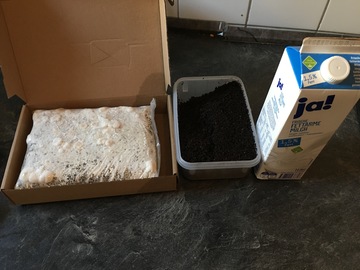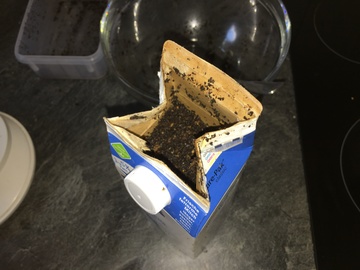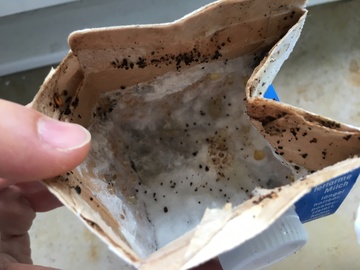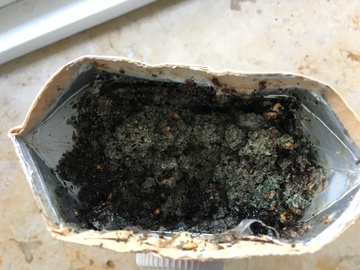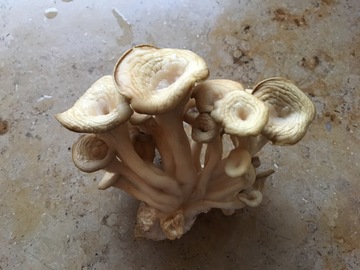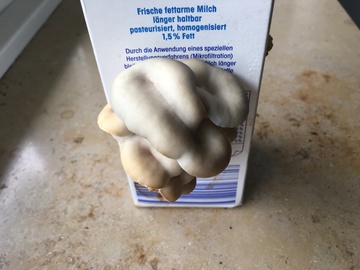August 4, 2018 Summer vacation over the Alps
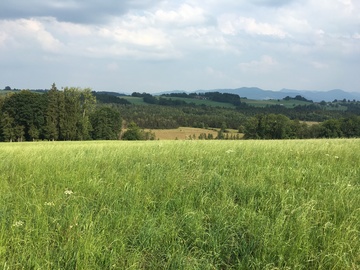 So as I've been always saying, the summer came. And this year it seems to be a dreadful one: we've been seeing new temperature records everywhere. At least here in Europe we can take some holidays. And this time, I decided to go from Munich to Italy, the country that I loved so much after my travel during the cycling trip 6 years ago.
So as I've been always saying, the summer came. And this year it seems to be a dreadful one: we've been seeing new temperature records everywhere. At least here in Europe we can take some holidays. And this time, I decided to go from Munich to Italy, the country that I loved so much after my travel during the cycling trip 6 years ago.
Since then I visited Italy only once, even though I lived in Lyon for quite some time, which is close to the Italian border. I probably come back to this point later.
This time, I'm travelling with Jen, who's been helping me in the organization of hikes for some time. This is the first time that I'm travelling with someone on a cycling trip that involves camping (last year I cycled with Clara in the Netherlands but at that time we did not camp).
The plan was simple: we start cycling in Munich and go towards the Mediterranean sea. Except for the beginning of the end (bus from Milan to Düsseldorf on the 19th), nothing was fixed. It's up to us to decide where to go and what to do.
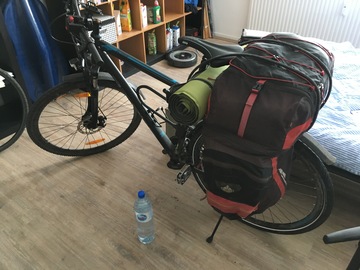 So my bicycle was fully loaded. It's not the one that I used to go to Japan (that one got stolen in France), but still a fairly good one. With all the stuff it was still possible to carry my bicycle.
So my bicycle was fully loaded. It's not the one that I used to go to Japan (that one got stolen in France), but still a fairly good one. With all the stuff it was still possible to carry my bicycle.
The drama started on the train. Firstly, the coach 5, in which we booked the places for our bikes, was a passenger coach. It turned out that the one that carried bicycles was coach 3. Chaos on the platform. Then on the train, we found out that our places were already taken. So we put our bicycles at other places.
The cooler on the coach was broken. We were forced to stay in this sauna.
Next station, Cologne. There were more bikes arriving. There was no place anymore. Here's apparently what happened: the logistics of the German railway completely failed and the reservation numbers were apparently completely wrong. Then there were also Dutch travellers, whose train had a delay and missed their original connection. So they took the one we were on. So, what's the solution of the German railway? Force them out. In the end these poor Dutch travellers were left on the platform at Cologne. This is German railway.
Somehow still we managed to arrive in Stuttgart. Being now a Bahn comfort customer (thanks to the hiking trips that I organized), I could stay in the lounge with Jen. Around one hour later, we went to the platform, only to find out that our train was cancelled. And the one one hour later as well. Great.
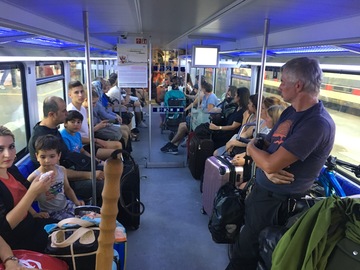 As an alternative, we had to take a local train for Ulm and then change trains there to go further to Munich. We entered the coach designed for special luggage. Jen asked the ones occupying the zone for bicycles to leave the space. No one stood up. In the end, we were forced to stay in the entrance area (which is actually quite dangerous with the bicycles).
As an alternative, we had to take a local train for Ulm and then change trains there to go further to Munich. We entered the coach designed for special luggage. Jen asked the ones occupying the zone for bicycles to leave the space. No one stood up. In the end, we were forced to stay in the entrance area (which is actually quite dangerous with the bicycles).
The departure time came, the train doesn't seem to leave. 20 minutes later, an announcement came, saying "there are technical problems on the train and we don't know how much time it is going to take. An alternative train for Ulm leaves from the opposite platform". We rushed to the other train, only to see that the original train leaving right after this.
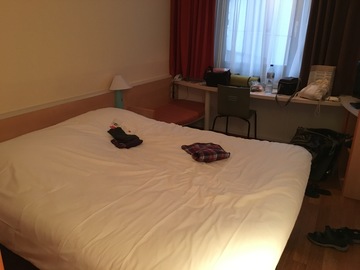 And the alternative train that we took was apparently the slowest local train and it took twice as much to go to Ulm as the original one (the one that was canceled would have been even faster). In the end, we gave up the hope to go to Munich and stayed in a hotel at Ulm. Great job, German railway.
And the alternative train that we took was apparently the slowest local train and it took twice as much to go to Ulm as the original one (the one that was canceled would have been even faster). In the end, we gave up the hope to go to Munich and stayed in a hotel at Ulm. Great job, German railway.
Ulm, being at the border between Bavaria and Baden-Württemberg, is not a very famous city even among Germans (although probably most of the people know the name). I was here briefly when I cycled from Lyon to Husum four years ago and at that time it appeared to me like a beautiful city. At that time I did not have enough time to explore the city. Today, we did. And indeed it is a very beautiful city. There is this distinct church which looks like the one in Cologne, with a large marketplace in front of it. And this was obviously the heart of the city center. This is how a German city is supposed to be constructed. In contrast, Düsseldorf does not have such a place, the real center of the center.
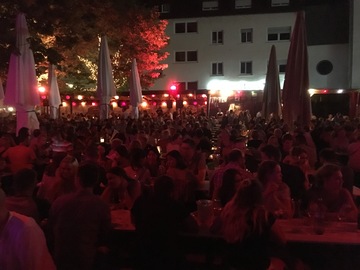 There was a wine festival in Ulm this evening. It was not much more than a beer garden, but still we took a glass of wine each. I had a glass of rosé called Weißherbst. The problem with rosé is that it is extremely difficult to find a good one, even though in summer, like now, it's too hot to drink red wine (and I don't like white wine). To my great surprise, this was a good one. Unfortunately I couldn't find out what the grape variety it was, as Weißherbst apparently only refers to the fact that it was made of one single grape type, and not a blend.
There was a wine festival in Ulm this evening. It was not much more than a beer garden, but still we took a glass of wine each. I had a glass of rosé called Weißherbst. The problem with rosé is that it is extremely difficult to find a good one, even though in summer, like now, it's too hot to drink red wine (and I don't like white wine). To my great surprise, this was a good one. Unfortunately I couldn't find out what the grape variety it was, as Weißherbst apparently only refers to the fact that it was made of one single grape type, and not a blend.
The reason why I couldn't find it out was because I had left my bag at the restaurant where we had dinner. So the wine festival for us was over quite abruptly. And so did this extremely long day go to an end.
Next day, with Jen looking quite awkward in the hotel, which is not very familiar to her, we went to the train station not early in the morning, to go to customer service with the hope that we might get a new ticket for Munich. We did, for free. This is a kind of situation where I always have to think how important it is to speak a local language. Even if it was German railway's fault and it was certainly not very cheap to stay in the hotel, we could still avoid the worst.
Munich-Innsbruck
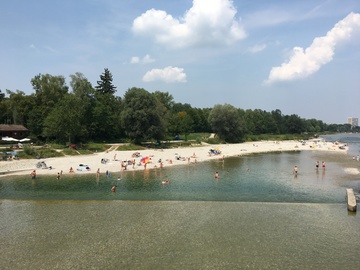 Munich has this river Isar, just as many cities around the world are built at rivers. However, in great contrast to Düsseldorf, Isar is a very beautiful river and we could see hoards of people everywhere on the riverside. Europe being in a great heatwave right now, this looked like an oasis. It was maybe a bit unfortunate for us as the train journey took nearly 24 hours and we really wanted to cycle at last.
Munich has this river Isar, just as many cities around the world are built at rivers. However, in great contrast to Düsseldorf, Isar is a very beautiful river and we could see hoards of people everywhere on the riverside. Europe being in a great heatwave right now, this looked like an oasis. It was maybe a bit unfortunate for us as the train journey took nearly 24 hours and we really wanted to cycle at last.
 On the other hand, we had a strong tail wind all day long. Cycling along the riverside felt like flying. With the Alps still far away, we could fully enjoy cycling on the flat road. And wherever we were, there was cold clean water.
On the other hand, we had a strong tail wind all day long. Cycling along the riverside felt like flying. With the Alps still far away, we could fully enjoy cycling on the flat road. And wherever we were, there was cold clean water.
Accordingly, we had a break in a small river where there was no one else, although in this vast area, it wasn't very difficult to find such a place even with this high number of tourists. My body was overheated in this moment, and entering the water was like putting a boiling kettle into an icy lake. In this moment, I thought I got a new strategy: cycle intensively and cool down in the river.
However, probably I should have known that the body doesn't allow you to go through such a cycle so easily: I was extremely sleepy after this. I don't now why, but apparently when you for example take a cold shower or swim in a pool, you feel sleepy even if you didn't lose much energy. I know this physiologic effect for quite some time and I enjoy taking a cold shower before I go to bed, but this time it was fairly hard to continue cycling after this.
Anyway, on the first day, we somehow managed to arrive at the campground Arzbacherhof, with a friendly staff and a nice beer garden. We put our tent right next to a small stream, which somehow helps me sleep well. Then to the beer garden for dinner.
Bavarian cuisine is a bit special. It consists of a lot of meat and potatoes. I still remember how much I struggled long time ago when I first arrived in Bamberg, with Schweinshaxe or Knödel. With this in mind, I got a salad, still a quite powerful one, and a soup. And of course, a pint of beer. This one sent me to a very deep sleep subsequently.
There's one thing I love about camping: it resets your body clock. Next day, I got up at 6am, fully awake, without an alarm. I stayed in the empty beer garden and waited for Jen.
Today, we were in a weird competition with another cyclist, that we saw at least 5 or 6 times over the entire day. At first we were just saying hi to each other but at some point we got into a conversation; he was also cycling from Munich to Venice. He was apparently going more slowly than us, but we might see each other more often.
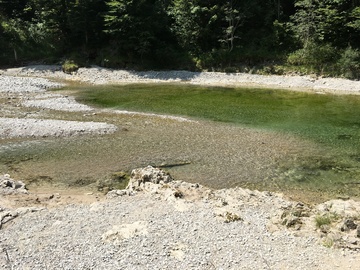 Nearing the Austrian border, we were clearly entering the Alps. The brilliant weather was making the situation even worse. At least the water was always nearby, so we could cool down our bodies whenever we needed. This particular one on the photo was where we had a break. And I must say it was way more beautiful than what you see on the photo. This time, by the way, I also had an extensive nap.
Nearing the Austrian border, we were clearly entering the Alps. The brilliant weather was making the situation even worse. At least the water was always nearby, so we could cool down our bodies whenever we needed. This particular one on the photo was where we had a break. And I must say it was way more beautiful than what you see on the photo. This time, by the way, I also had an extensive nap.
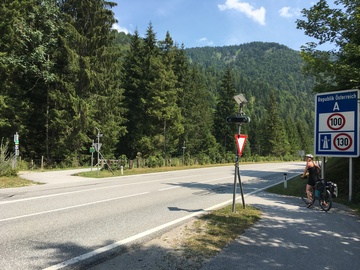 So did we arrive at the Austrian border. There might have been also refugees a few years ago at this border, but today, it's a very calm place, with only this collapsing old building.
So did we arrive at the Austrian border. There might have been also refugees a few years ago at this border, but today, it's a very calm place, with only this collapsing old building.
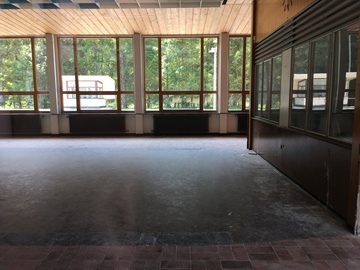 There was a small shop right next to the border, which might have been an important one when the border was there. We could order slices of bread, cheese and ham (all local) for lunch. Even though it was far away from what you might think of a restaurant, it was exactly what we needed in this moment. It's a pity that such a place doesn't exist elsewhere.
There was a small shop right next to the border, which might have been an important one when the border was there. We could order slices of bread, cheese and ham (all local) for lunch. Even though it was far away from what you might think of a restaurant, it was exactly what we needed in this moment. It's a pity that such a place doesn't exist elsewhere.
Right after this, we had a lengthy slope. So lucky that we got something to eat beforehand, especially regarding the fact that it was Sunday yesterday and we couldn't buy anything, and there was nothing up to this point today.
We reached a plateau after this slope, which somewhat characterizes the Alps, at least in this region. And this was an extremely touristic place. In particular, there's this lake called Achen lake, which was FULL of tourists. It was more than a good decision not to look for a place to camp.
The height that we had gained before the Achen lake went away very quickly after the lake. It felt like we were going down an abyss by bike. We could even feel a strong temperature difference before and after. Anyway, this wasn't particularly a problem in this moment: there was a storm coming in front of us. First we had to go through a strong head wind. Then the rain came. There was only one campground and it was still quite far away. No other choice. We continued cycling.
Luckily, the rain didn't become very hard. It was starting to become dark but we managed to arrive at the campground Schloss camping Aschach. We had no energy to talk anymore. We simply prepared the tent in silence, then still cooked some stuff for dinner.
Innsbruck - South Tirol
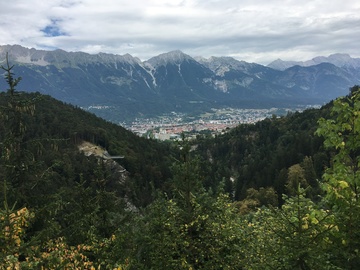 It's been a while since I did a cycling trip like this one. When I got up next morning, I could feel the exhaustion from the previous day. Apparently Jen was having the problem already on the second day. It might become difficult over time to go over Alps like this...
It's been a while since I did a cycling trip like this one. When I got up next morning, I could feel the exhaustion from the previous day. Apparently Jen was having the problem already on the second day. It might become difficult over time to go over Alps like this...
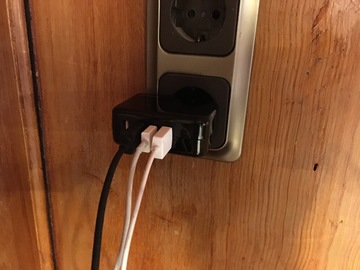 Innsbruck, which is a fairly important Austrian city, turned out to be a quite small one. It is quite common that in the Alps, like in Switzerland, the famous cities are very small, like Basel or the Swiss capital, Bern. Before crossing the city, we entered a bakery for my breakfast. There was only one socket for electricity, and since Jens' phone had no battery anymore, only her phone could be charged. This has been a strategical problem since the beginning. So we absolutely needed one USB charger with several sockets. Innsbruck still being an important city, we could find one Mediamarkt. And I got one charger with 4 sockets. It came to me like a huge relief as we wouldn't be able to go anywhere without our phones.
Innsbruck, which is a fairly important Austrian city, turned out to be a quite small one. It is quite common that in the Alps, like in Switzerland, the famous cities are very small, like Basel or the Swiss capital, Bern. Before crossing the city, we entered a bakery for my breakfast. There was only one socket for electricity, and since Jens' phone had no battery anymore, only her phone could be charged. This has been a strategical problem since the beginning. So we absolutely needed one USB charger with several sockets. Innsbruck still being an important city, we could find one Mediamarkt. And I got one charger with 4 sockets. It came to me like a huge relief as we wouldn't be able to go anywhere without our phones.
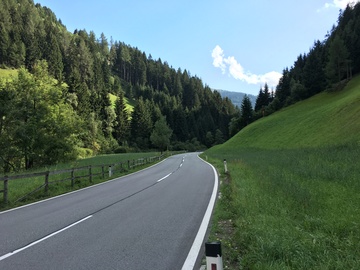 By the way, I never really thought about the origin of the name "Innsbruck". As I found out, there was this river called "Inn" that goes through Innsbruck. And "Brücke" is a German word for "bridge". So Innsbruck literally means "Inn's bridge". Not a surprise that it's a small city.
By the way, I never really thought about the origin of the name "Innsbruck". As I found out, there was this river called "Inn" that goes through Innsbruck. And "Brücke" is a German word for "bridge". So Innsbruck literally means "Inn's bridge". Not a surprise that it's a small city.
We had a quite easy day yesterday, but today, right after Innsbruck, we had to overcome an altitude of 400m, which is certainly not the most difficult thing I've done by bike, but still it was hard enough to make us silent for some time. At least there were some clouds that cut the sunlight.
At the same time, this is what you might think of the Alps. The scenery of hilly grass fields is reminiscent of Heidi. Even though there was a highway going not far away from where we were, I had the feeling that we were breathing the best air on the planet.
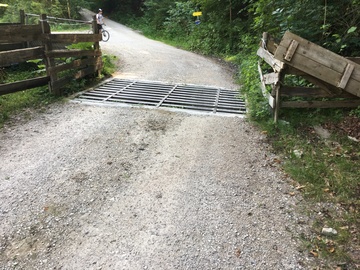 The animals were living simply with the people, and at the entrance of the village, sometimes you see this kind of lattice, which can be crossed by humans but not by animals. Quite clever, although it's important to think about cycling in the direction perpendicular to it...
The animals were living simply with the people, and at the entrance of the village, sometimes you see this kind of lattice, which can be crossed by humans but not by animals. Quite clever, although it's important to think about cycling in the direction perpendicular to it...
Going upwards, we noticed that the temperature was going down accordingly. And there was no campsite in sight. Not quite sure where to stay tonight.
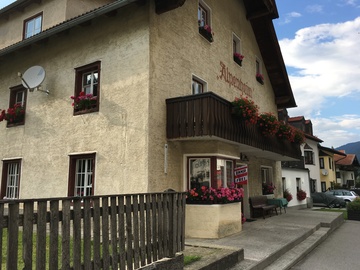 Before we started cycling, Jan, who also joins us every now and then on the hikes, who by some chance was traveling also in Italy, told us that there are many private houses, who don't put their offer in the internet, mainly because those who run the business are too old to know how to put it in the internet. And they tend to be cheaper. Anyway, I checked hostels nearby, and indeed on open street maps I could see quite some places that did not show up in the internet. We decided to try it out ourselves.
Before we started cycling, Jan, who also joins us every now and then on the hikes, who by some chance was traveling also in Italy, told us that there are many private houses, who don't put their offer in the internet, mainly because those who run the business are too old to know how to put it in the internet. And they tend to be cheaper. Anyway, I checked hostels nearby, and indeed on open street maps I could see quite some places that did not show up in the internet. We decided to try it out ourselves.
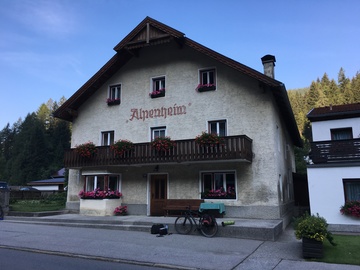 It might be important for you to know that the average offer is around 90 € for 2 people in this area. With this in mind, we were thinking about 70 € for both of us. We visited one place, and as we had imagined we were welcomed by an old lady. The price: 48 € for two people with breakfast. What a difference.
It might be important for you to know that the average offer is around 90 € for 2 people in this area. With this in mind, we were thinking about 70 € for both of us. We visited one place, and as we had imagined we were welcomed by an old lady. The price: 48 € for two people with breakfast. What a difference.
This was another occasion in which I thought how important it is to speak the local language.
There was a supermarket nearby, open until 6pm. And obviously this was the only one in this hamlet. Actually we were lucky that there was one. And we were probably also lucky that there was a restaurant right in front of the house. It's hard to end a day without half a liter of beer, just as what people do in this region.
Next day, when we got up, the breakfast was prepared on the table. Except for the fact that we slept quite long, we could start the day fairly early today.
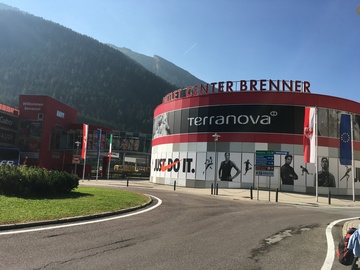 The Italian border was not far away from there. Both Italy and Austria (as well as Germany) being within the Schengen zone, there's virtually no border anymore. However, there were obviously activities around this place. Coming from a country which doesn't really know the notion of land border, I always find the existence of such a thing quite intriguing. Today, the Austrian-Italian border is simply an outlet mall, but probably these buildings used to be used for official purposes before.
The Italian border was not far away from there. Both Italy and Austria (as well as Germany) being within the Schengen zone, there's virtually no border anymore. However, there were obviously activities around this place. Coming from a country which doesn't really know the notion of land border, I always find the existence of such a thing quite intriguing. Today, the Austrian-Italian border is simply an outlet mall, but probably these buildings used to be used for official purposes before.
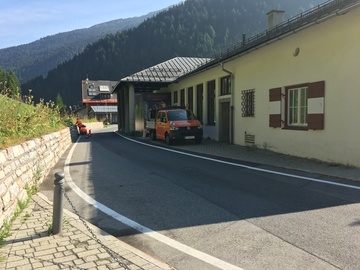 Especially, this region, South Tyrol is a complicated place. This German speaking region belonged to Austria until the end of the World War I. Since then it is part of Italy, but the population is still largely German speaking. According to what I learned, they also feel abandoned by the Germanic countries, which makes the situation even more complex. They are apparently going to get a double nationality from next year (cf. this article). I don't know if the problem is solved then.
Especially, this region, South Tyrol is a complicated place. This German speaking region belonged to Austria until the end of the World War I. Since then it is part of Italy, but the population is still largely German speaking. According to what I learned, they also feel abandoned by the Germanic countries, which makes the situation even more complex. They are apparently going to get a double nationality from next year (cf. this article). I don't know if the problem is solved then.
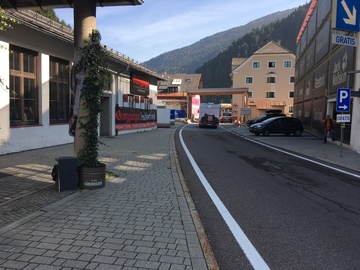 It is anyway a tragedy that this extremely beautiful place has been a focus of political conflict. Fortunately, it's now simply part of the EU. If Italy is not going too much in the nationalist movement, maybe it is anyway not particularly important to talk about borders.
It is anyway a tragedy that this extremely beautiful place has been a focus of political conflict. Fortunately, it's now simply part of the EU. If Italy is not going too much in the nationalist movement, maybe it is anyway not particularly important to talk about borders.
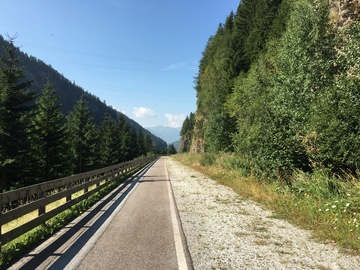 At the border, we bumped into a guy who was cycling up to Bulgaria. He was saying this path is the easiest one crossing the Alps. So far I'm not surprised to hear that.
At the border, we bumped into a guy who was cycling up to Bulgaria. He was saying this path is the easiest one crossing the Alps. So far I'm not surprised to hear that.
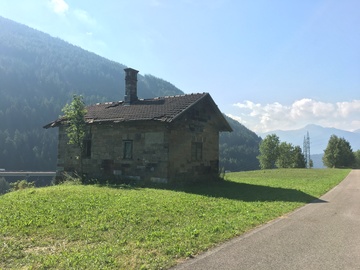 Just as in many countries, the border was at the highest point of this region. We went down a long slope for some time, enjoying the scenery reminiscent of Heidi. On the way, however, there were some old buildings falling apart over time. They must have been built at least decades ago. There were not only one or two of them, but they were too see regularly over the way. It looks like the cycling lane we were cycling on was used as a street or a railway line. And maybe these buildings were used as stations or some other stops.
Just as in many countries, the border was at the highest point of this region. We went down a long slope for some time, enjoying the scenery reminiscent of Heidi. On the way, however, there were some old buildings falling apart over time. They must have been built at least decades ago. There were not only one or two of them, but they were too see regularly over the way. It looks like the cycling lane we were cycling on was used as a street or a railway line. And maybe these buildings were used as stations or some other stops.
In the first city after the border, we had lunch. Next to us was a young couple from Italy. For the first time after quite some time I spoke Italian (even though it was only about whether the seat next to us was available or not)...
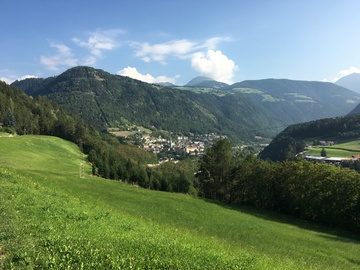 We went further. The bike way looked perfect at first. However, at some point we bumped into a couple from Italy. I was far behind Jen and saw only that she was explaining to them that she doesn't understand Italian. They then came towards me and started explaining that the path in front of us was closed due to construction works with quite some emotions (how difficult it is to recognize the place and which way has to be taken in order to avoid this problem). They looked very happy to have been able to help us (and not to mention that we were also happy to get this piece of information). Italians are, as much as I know, always glad to help other people, even if not everyone does the same. It must be frustrating for them that not many people speak Italian, as they are not the people that speak foreign languages the best.
We went further. The bike way looked perfect at first. However, at some point we bumped into a couple from Italy. I was far behind Jen and saw only that she was explaining to them that she doesn't understand Italian. They then came towards me and started explaining that the path in front of us was closed due to construction works with quite some emotions (how difficult it is to recognize the place and which way has to be taken in order to avoid this problem). They looked very happy to have been able to help us (and not to mention that we were also happy to get this piece of information). Italians are, as much as I know, always glad to help other people, even if not everyone does the same. It must be frustrating for them that not many people speak Italian, as they are not the people that speak foreign languages the best.
The story of my Italian started around 10 years ago. At that time, I was living in a student dormitory. There was an Italian girl, Chiara, in the room next to mine. Not quite surprisingly, she didn't speak German, nor English. Whereas there was much communication between us, she tended to use Italian words whenever she did not know how to say something in German. Like this one:
Chiara: "Do you have Aceto?" (pronounced like "Acheto")
Not a word that I was familiar with. However, I somehow managed to think of "acetic acid" (of which the term "acetic" sometimes becomes "aceto" depending on the morphology), probably because I tried to think of scientific words, which usually derive from Latin words. And Italian being 90% Latin, it makes often sense to relate it to Latin. The thing is, the acetic acid is the main ingredient of vinegar. Hence, what she was looking for was vinegar.
Trying to find out what Chiara was trying to say was a fun activity for me. Later on, I got in touch with way more Italian students, mainly because a lot of parties in Göttingen, where I studied, were created by Italian and Spanish students. German being a fairly difficult language, it happened quite often that they simply continued speaking their own languages. At the beginning I had hard times figuring out what they wanted to say. After some time, I started understanding some words, and probably much more. Anyway, whatever language they spoke, I always replied in German. Since I was not good at English either at that time, there was no other way for me.
Even though I kind of had the feeling I knew what Italian students were saying, I didn't think I'd be able to communicate only in Italian. At my first visit in Italy during my bicycle trip, I had a quite awkward first encounter with an Italian lady at Genoa, where I was speaking a mixture of English and Italian even though I knew what I was saying could not be understood. At that time, I had to think about what it would have sounded like if I had said everything in Italian. Surprisingly, I found out that I could have said everything in Italian.
It was towards the end of my stay in Italy that I was definitely sure that I was able to speak Italian. Not that I learned the language quickly during my stay there, but I simply was not aware of what I had learned from these Italian students. Learning a new language to many people is probably something like visiting language courses to learn the basic grammar and going through pre-defined steps. My experience with the Italian students gave me a whole new notion of this, something many people probably don't believe in. But ultimately, what we are doing is communicate with other people, and it is certainly not that surprising that you learn a new language by trying to understand what other people are saying.
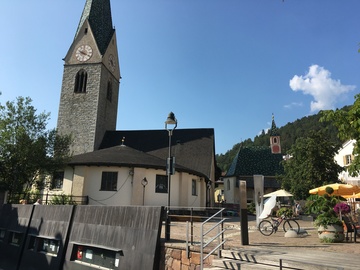 From the moment this Italian couple told us there were obstacles, we actually had to think of which way to take every now and then, because the trail we were having was obviously not up to date. On the other hand, it somewhat showed that these cycling routes are renewed now. It will probably become much more fun to cycle in Italy.
From the moment this Italian couple told us there were obstacles, we actually had to think of which way to take every now and then, because the trail we were having was obviously not up to date. On the other hand, it somewhat showed that these cycling routes are renewed now. It will probably become much more fun to cycle in Italy.
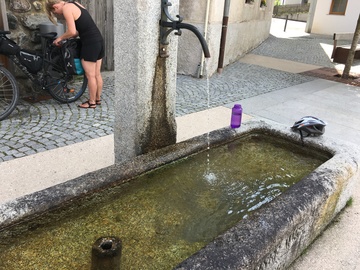 There's one absolutely positive thing about outside Germany: functioning basic infrastructure. Just as well as in Austria, there are water fountains everywhere here in Italy, so that you can simply move around with an empty bottle and get water whenever you find one. I don't know one single place in Germany where you can get water for free. Similarly, the mobile internet works everywhere outside of Germany. It almost doesn't matter whether you are in the nature or not. In Germany, on the other hand, you might see that even within a city you don't get the internet on your phone. Similar things are applied to post, railway etc. It's somewhat weird too see how miserable those things are in Germany...
There's one absolutely positive thing about outside Germany: functioning basic infrastructure. Just as well as in Austria, there are water fountains everywhere here in Italy, so that you can simply move around with an empty bottle and get water whenever you find one. I don't know one single place in Germany where you can get water for free. Similarly, the mobile internet works everywhere outside of Germany. It almost doesn't matter whether you are in the nature or not. In Germany, on the other hand, you might see that even within a city you don't get the internet on your phone. Similar things are applied to post, railway etc. It's somewhat weird too see how miserable those things are in Germany...
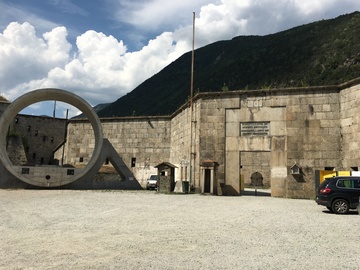 There was exactly one campsite and we were arriving way too early. On the way, however, there was a fortress, which was a museum at the same time. It was called Franzensfeste and was constructed in the 19th century, when Austria was still having a strong hangover of Napoleon's invasion. With much expenses, it was supposed to barricade the path to the Austro-Hungarian empire. Unfortunately, Austria losing WWI and South Tyrol being annexed to Italy, they lost control over the fortress without really using it. Then during WWII it was geographically useless and with the invention of airplanes it was not quite relevant anymore. However, these were probably the reason why this fortress was not destroyed in history, although except for the fact that it looks like a nice village inside, there isn't much to see right now. According to the information we got inside, they might put more stuff some time in the future.
There was exactly one campsite and we were arriving way too early. On the way, however, there was a fortress, which was a museum at the same time. It was called Franzensfeste and was constructed in the 19th century, when Austria was still having a strong hangover of Napoleon's invasion. With much expenses, it was supposed to barricade the path to the Austro-Hungarian empire. Unfortunately, Austria losing WWI and South Tyrol being annexed to Italy, they lost control over the fortress without really using it. Then during WWII it was geographically useless and with the invention of airplanes it was not quite relevant anymore. However, these were probably the reason why this fortress was not destroyed in history, although except for the fact that it looks like a nice village inside, there isn't much to see right now. According to the information we got inside, they might put more stuff some time in the future.
We arrived at the campsite. Surprisingly, we saw Franz /Ferdinand again, who was in a weird competition before Innsbruck. He was actually a manufacturer of bikes, although his bike looked like having way too much stuff for a trip of 3 weeks (in which he is also going to Venice).
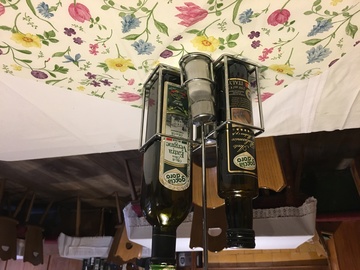 Apparently here in Italy, there's always this spice set, which consists of olive oil, vinegar (usually Balsamico), salt and pepper.
Apparently here in Italy, there's always this spice set, which consists of olive oil, vinegar (usually Balsamico), salt and pepper.
It was extremely windy in the night and we could hear thunders a few times. It did not rain fortunately, but in the mountains it's difficult to predict the weather. We have to be careful..
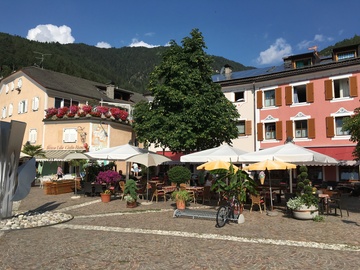 Next day, we had breakfast in a nearby city. The city itself looked like a piece of art. I don't know if they earn much money except for tourism, but it must be inspiring to live in such a city in the middle of the Alps. We saw Franz Ferdinand passing by.
Next day, we had breakfast in a nearby city. The city itself looked like a piece of art. I don't know if they earn much money except for tourism, but it must be inspiring to live in such a city in the middle of the Alps. We saw Franz Ferdinand passing by.
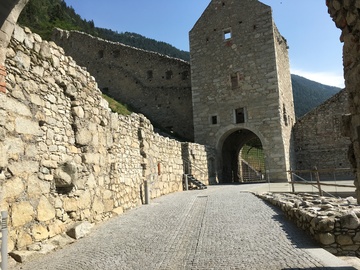 We had lunch at Bruneck, a city in which there was a horrible mixture of German and Italian. There were even people who spoke Portuguese on the street. In the supermarket where I bought fruits, they apparently have to say the prices and all in two languages. It must be exhausting to live like that.
We had lunch at Bruneck, a city in which there was a horrible mixture of German and Italian. There were even people who spoke Portuguese on the street. In the supermarket where I bought fruits, they apparently have to say the prices and all in two languages. It must be exhausting to live like that.
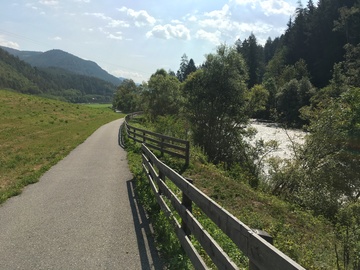 There was a large river right after Bruneck. So great that there's clean water near a large city like Bruneck. And especially, there was no one, unthinkable if it would have been in Germany.
There was a large river right after Bruneck. So great that there's clean water near a large city like Bruneck. And especially, there was no one, unthinkable if it would have been in Germany.
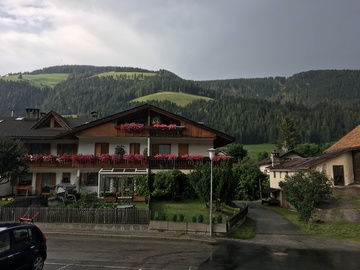 After some time on the way, we could see more and more clouds gathering. They evolved so fast that from a blue sky we could already see far away that it was raining. I checked the weather map on my phone. It looked like there was a storm passing on our way. Then we decided to stop at a café. The storm didn't really come. After a cup of coffee and a piece of cake there, we started cycling. We entered the storm in the right moment.
After some time on the way, we could see more and more clouds gathering. They evolved so fast that from a blue sky we could already see far away that it was raining. I checked the weather map on my phone. It looked like there was a storm passing on our way. Then we decided to stop at a café. The storm didn't really come. After a cup of coffee and a piece of cake there, we started cycling. We entered the storm in the right moment.
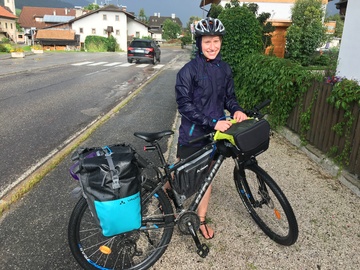 I still had the bicycle bags of my bicycle trip 6 years ago. And just as that time, they aren't so appropriate when it's raining really hard (at that time it didn't really matter as I was very often in deserts). We stopped in a hut nearby, but according to the weather map it didn't look like it was about to stop. So despite the heavy rain we continued cycling.
I still had the bicycle bags of my bicycle trip 6 years ago. And just as that time, they aren't so appropriate when it's raining really hard (at that time it didn't really matter as I was very often in deserts). We stopped in a hut nearby, but according to the weather map it didn't look like it was about to stop. So despite the heavy rain we continued cycling.
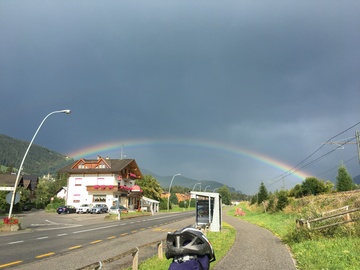 Fortunately, it did stop. I don't really understand what this weather map really understands. And we somehow managed to arrive at a campsite nearby.
Fortunately, it did stop. I don't really understand what this weather map really understands. And we somehow managed to arrive at a campsite nearby.
I first looked for Franz Ferdinand, who was appearing in our trip every now and then so far. He wasn't there at the field where we were ushered to put out tent. This field was allegedly an emergency field in case there are too many people. According to what we eavesdropped, the campsite is full until the end of September. It must be horrible for them to turn down all the requests that they get everyday, especially when the people directly come to the campsite and ask.
After putting the tent, we went over to the restaurant. There he was, Franz Ferdinand, as if he was destined to appear on our trip at each occasion. We had dinner together and beer afterwards.
It was so far the coldest night we had on our trip. Fortunately, I had two sleeping bags and Jen got an extra blanket from Franz Ferdinand. By the way, Franz Ferdinand should be simply called "Franz". I just always called him "Franz Ferdinand", because it sounded so noble. It might not sound so funny if he'd ever go to Sarajevo...
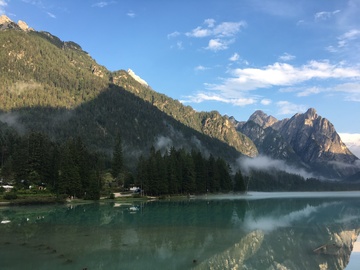 Next day, the weather forecast was predicting a storm from midday, although there were conflicting reports among websites. Wetter.com, the one that I'm not trusting as much anymore, was saying it wouldn't rain. Google weather and Meteo Italia were both saying there's a storm from noon. I decided to trust the latter information and tried to book a hotel not very far away from where we were. There's one thing I must say though: usually everywhere in Europe you can get a hotel for something like 60 € per night, maybe 80. However, I could not find anything less than 120 € per night today. And 120 € was absolutely the cheapest one and the second cheapest was something like 150 € per night. The reason for this is that this region, Dolomiten, is famous for hiking or mountain climbing among German tourists (according to Jen) and there were too many tourists right now. Still it's crazy to see such a situation here.
Next day, the weather forecast was predicting a storm from midday, although there were conflicting reports among websites. Wetter.com, the one that I'm not trusting as much anymore, was saying it wouldn't rain. Google weather and Meteo Italia were both saying there's a storm from noon. I decided to trust the latter information and tried to book a hotel not very far away from where we were. There's one thing I must say though: usually everywhere in Europe you can get a hotel for something like 60 € per night, maybe 80. However, I could not find anything less than 120 € per night today. And 120 € was absolutely the cheapest one and the second cheapest was something like 150 € per night. The reason for this is that this region, Dolomiten, is famous for hiking or mountain climbing among German tourists (according to Jen) and there were too many tourists right now. Still it's crazy to see such a situation here.
Fortunately, I found one hotel for 80 € in Borca di Cadore, a city a bit father away. Apparently it was far away enough that it's not inside the touristic zone anymore.
When we were about to leave, we noticed that Jen's bike had a flat tyre. There was apparently one thorn in the tyre and it went through to the tube. Anyway, while I was fixing the problem I probably damaged the tyre. Now there was a swelling on the side of her tyre, a kind of one that becomes worse over time. We had to quickly find a bike shop to buy a new tyre.
South Tyrol - Vittorio Veneto
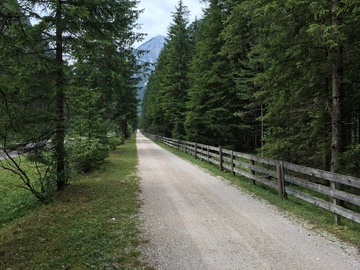 We started cycling. There were tons of German tourists cycling on their E-bikes. I assume that they rented these bikes at the campsite. Jen and I were going uphills on our own. Luckily it didn't take much time to achieve the highest point. And this highest point was the border between German speaking Italy (South Tyrol) and Italian speaking Italy (Veneto).
We started cycling. There were tons of German tourists cycling on their E-bikes. I assume that they rented these bikes at the campsite. Jen and I were going uphills on our own. Luckily it didn't take much time to achieve the highest point. And this highest point was the border between German speaking Italy (South Tyrol) and Italian speaking Italy (Veneto).
 After crossing this line, it felt like we were at once losing all the height that we gained over the past few days, although the slope was not that steep so that we could enjoy the downhill for quite some time.
After crossing this line, it felt like we were at once losing all the height that we gained over the past few days, although the slope was not that steep so that we could enjoy the downhill for quite some time.
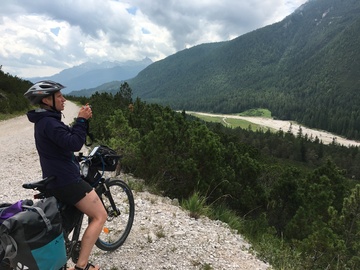 Whatever the weather forecast was saying, the sky was blue (more than what you see on the photo). And it was hard to believe that it predicted a storm. Towards Munich and Innsbruck, on the other hand, it was apparently quite stormy. So they (weather forecast) had probably hard time predicting where it's going to happen. It's anyway dodgy that only wetter.com had predicted the right weather, the one that I don't trust as much anymore.
Whatever the weather forecast was saying, the sky was blue (more than what you see on the photo). And it was hard to believe that it predicted a storm. Towards Munich and Innsbruck, on the other hand, it was apparently quite stormy. So they (weather forecast) had probably hard time predicting where it's going to happen. It's anyway dodgy that only wetter.com had predicted the right weather, the one that I don't trust as much anymore.
We arrived in a medium size city, Cortina d'Ampezzo, where we could find one bike shop. They had the right one, for a good price, and even changed the tyres on the spot. Jen seemed to be happy to have a professional do the job. 5 minutes later, the bicycle came back, with the tyre put in the wrong direction (NB: there's a rolling direction for bike tyres, just as car tyres). I don't know if it really makes any difference, but it looks at least quite unprofessional...
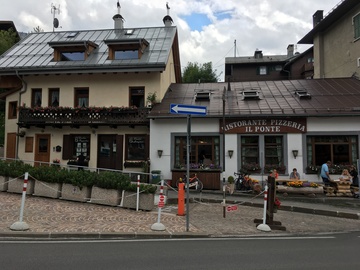 We had lunch in the restaurant right next to the bike shop. There, we put our bikes in front of the restaurant. Then the owner of the store next to the restaurant started complaining that it disturbs her and we should put our bikes elsewhere etc. This Italian grandma was powerful, even though still I don't see any legal right for her to make us remove the bikes from there...
We had lunch in the restaurant right next to the bike shop. There, we put our bikes in front of the restaurant. Then the owner of the store next to the restaurant started complaining that it disturbs her and we should put our bikes elsewhere etc. This Italian grandma was powerful, even though still I don't see any legal right for her to make us remove the bikes from there...
Since Cortina d'Ampezzo was a fairly large city, we decided to go shopping to get stuff for tonight. Tonight we wanted to have normal German dinner, i.e. bread, cheese and ham, with some salad. As I usually don't eat ham, I had hard time figuring out what kinds of ham there were at the counter. Then, we needed bread, but couldn't find any. We noticed that there was also a bread counter, but they didn't have what we were looking for, either. Apparently here in Italy, they use this light wheat, which they use for pizza, to make bread as well, so that you get only white and light bread, whereas in Germany, bread is rather dark and massive, especially the one that you eat for dinner. In the end, we had two ciabattine, which I used to use to make sandwiches when I was in Germany, but a far lighter one than the ones that I used to use.
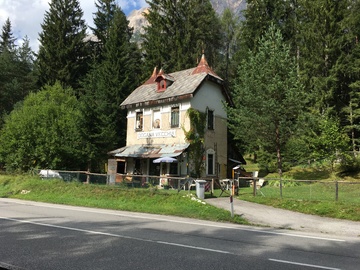 We continued going down the hill. Since the beginning of South Tyrol, there were a significant number of isolated buildings like this one. On open street maps they were indicated as stations. Probably just as I wrote above, there was a railway line where we were cycling. I might have loved to take a train that goes through such a beautiful region.
We continued going down the hill. Since the beginning of South Tyrol, there were a significant number of isolated buildings like this one. On open street maps they were indicated as stations. Probably just as I wrote above, there was a railway line where we were cycling. I might have loved to take a train that goes through such a beautiful region.
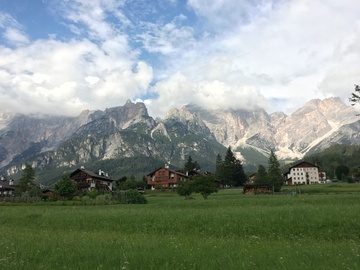 Some time in the afternoon, I noticed that the mobile internet was not working. My phone was showing it was connected to the internet but nothing was shown. Well, fortunately the maps are off-line so we could continue cycling anyway.
Some time in the afternoon, I noticed that the mobile internet was not working. My phone was showing it was connected to the internet but nothing was shown. Well, fortunately the maps are off-line so we could continue cycling anyway.
We arrived at the hotel, which turned out to be actually a fully equipped apartment. At the same time we also discovered it was nearly impossible to get food outside with this place far away from anything. So the decision to buy stuff for dinner at Cortina turned out to be a brilliant idea.
In he evening, I was checking the campsites nearby. At one of them, I noticed that there were three price classes: low season, high season and peak season. It's not surprising that we were in the peak season, but its period was weird: from Aug. 10 to Aug. 19, i.e. starting today for 10 days. Not quite understanding what is so special about this week, I contacted Nicola, our Italian friend who joins us on many hikes. As it turned out, this is a special week for Italy, in which all the Italians travel at the same time. And the 15th of August is called Farragosto and is supposed to be a day of festivals. In Nicola's hometown there are fireworks in the evening on that day. So, apparently we took an extremely wrong period of time where probably everything is closed or many times as expensive as usual.
By the way, the problem with the mobile internet that I was having was apparently related to my German phone provider, ALDI Talk, as I found out in the evening looking it up in the internet. Hopefully it's gonna be fine tomorrow during the day.
Next morning, I was still eating the same ham from the previous evening. There was a moka pot in the apartment, but I didn't have coffee. I should have checked it out better before coming there.
Right after we started cycling, we found a café, with the owner obviously more than willing to speak English. At the table behind ours were two old ladies, one of whom smiled at us constantly. I talked to her to ask what this special vacation week looks like in Italy. She looked like she was very happy to help a foreigner, maybe especially she probably didn't speak English. Anyway according to her, the supermarkets and normal shops should be more or less open, at least not that we'd have significant problems on the way. Talking about our bike travel, she explained to us (or to me, since Jen doesn't speak Italian) where to take a bus in order to go to Venice, or where to take a train and how much it is going to cost. I failed to make her understand that we were cycling all the way up to Venice, but probably not because of my Italian :). Anyway, it was great to talk to someone like her, who enjoys talking to a foreigner like me, and also to see that the old lady next to where we were also joined the conversation.
The problem with the mobile internet that I was having yesterday was still persisting. At least by contacting a few friends in Germany I knew that the problem was related to the provider and not because of me or Italy. Nothing else to do than just wait.
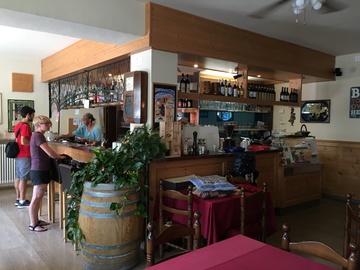 We stopped in a very small city on the way for lunch, which looked like the only one place with a restaurant. I had the feeling that everyone at the restaurant was looking at us. Maybe it doesn't occur very often that there's an Asian tourist arriving by bicycle just like this.
We stopped in a very small city on the way for lunch, which looked like the only one place with a restaurant. I had the feeling that everyone at the restaurant was looking at us. Maybe it doesn't occur very often that there's an Asian tourist arriving by bicycle just like this.
When we arrived at the restaurant, I briefly got my internet back. I knew the campsites nearby and did not have much hope on them. So I looked for hotels, with even less hope, and found one for 50 €, which was a 4-star hotel. Aha? The reviews looked also okay, so I quickly made a reservation. Then the mobile internet connection went dead again (which came back some time in the evening). What a luck.
There's something I don't really understand about the Italian cuisine: when you open the menu, you'll see there are antipasti, primi piatti and secondi piatti. Literally, they are translated to starters, first plates and second plates. So for lunch, I would then expect to be expected to choose one from each category, to have a full course. However, the prices are quite high and also you get a significant quantity every time. So my hypotheses are: 1, you order simply one dish from any of the category and that's your lunch/dinner; 2, the dishes are supposed to be shared among the people at the table. I'm right now rather inclining to the second hypothesis, as it appears a bit weird to me to order just one antipasto. Hopefully I'm going to have an occasion to talk about this with other Italians.
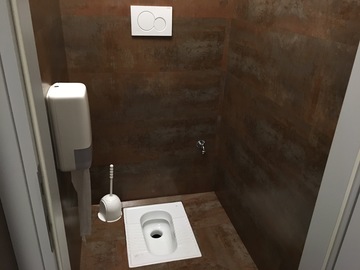 In this restaurant, there's what we call "French toilet", which is called Turkish toilet in France, Asian toilet in Turkey and Japanese toilet in Japan. German people find it disgusting, which I did, too, until I did my bicycle trip over Asia. Actually if the toilet is really dirty, you will probably prefer this one to the normal Western toilet.
In this restaurant, there's what we call "French toilet", which is called Turkish toilet in France, Asian toilet in Turkey and Japanese toilet in Japan. German people find it disgusting, which I did, too, until I did my bicycle trip over Asia. Actually if the toilet is really dirty, you will probably prefer this one to the normal Western toilet.
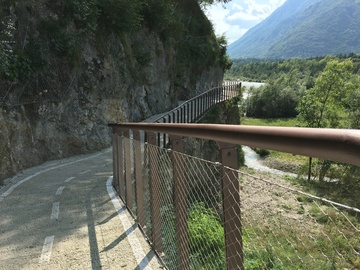 After the restaurant, we were cycling along a steep rock cliff. On the cliff, however, there were caves every now and then, from which cold air was streaming. So these caves are not just some indentation in the rock, but they must be somehow interconnected. Even though I can totally understand that due to security reasons it is not possible to enter these caves, I still wondered if they were used for military purposes sometime in the past.
After the restaurant, we were cycling along a steep rock cliff. On the cliff, however, there were caves every now and then, from which cold air was streaming. So these caves are not just some indentation in the rock, but they must be somehow interconnected. Even though I can totally understand that due to security reasons it is not possible to enter these caves, I still wondered if they were used for military purposes sometime in the past.
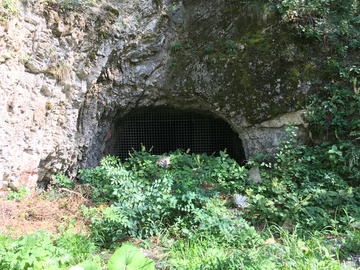 In the evening, we arrived at the hotel, which stood pretty much in the middle of nowhere. From the road side, we wondered if it was really a 4 star hotel, but when we entered the area, the quality was clear. With a large garden, we got a very large place with two rooms. Hard to believe that it was just 50 €. My guess is there was someone else reserving this room, but canceled it in the last moment, so that we could make a reservation a few hours earlier today. Whatever the reason is, huge luck it was.
In the evening, we arrived at the hotel, which stood pretty much in the middle of nowhere. From the road side, we wondered if it was really a 4 star hotel, but when we entered the area, the quality was clear. With a large garden, we got a very large place with two rooms. Hard to believe that it was just 50 €. My guess is there was someone else reserving this room, but canceled it in the last moment, so that we could make a reservation a few hours earlier today. Whatever the reason is, huge luck it was.
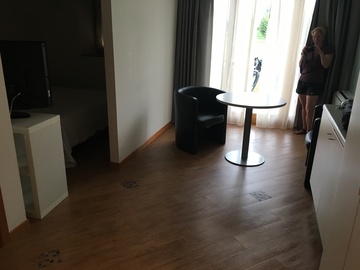 There was a Lidl nearby (which is a German supermarket chain). Inside it looked exactly like Lidl, although the quality was higher here. We went there to get something for breakfast for the next day and a bottle of wine. For those who are not familiar with the price range of wine: a good bottle of wine can be bought from around 6 € in France, and 8 € in Germany, although with a bit of luck, you might get a good one up to 2 € less in each case. Here, at Lidl, however, we could not find any bottle over 5 €. And no bottle over 3 € for local wines. Not so sure whether to buy one at the first place, but still we bought a random relatively local one from Emilia Romagna for something like 2,50 €.
There was a Lidl nearby (which is a German supermarket chain). Inside it looked exactly like Lidl, although the quality was higher here. We went there to get something for breakfast for the next day and a bottle of wine. For those who are not familiar with the price range of wine: a good bottle of wine can be bought from around 6 € in France, and 8 € in Germany, although with a bit of luck, you might get a good one up to 2 € less in each case. Here, at Lidl, however, we could not find any bottle over 5 €. And no bottle over 3 € for local wines. Not so sure whether to buy one at the first place, but still we bought a random relatively local one from Emilia Romagna for something like 2,50 €.
We had pizza for dinner. Even though the pizza are really good in Italy, I still wonder how often we'll be have eaten pizza in total during our stay in Italy.
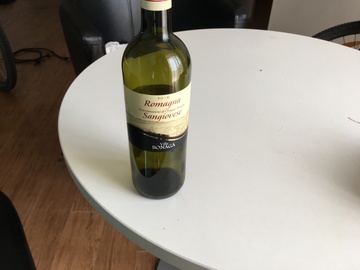 At the hotel, we opened the wine. And actually it was quite okay, not like the one you get in Germany for the same price. Apparently here in Italy, you get a good bottle of wine from 2 or 3 €
At the hotel, we opened the wine. And actually it was quite okay, not like the one you get in Germany for the same price. Apparently here in Italy, you get a good bottle of wine from 2 or 3 €
While drinking wine, we had to think about what we are going to do in our trip next. There's still a week to go until the end of out trip, which must finish at Milan next Sunday, as our bus will leave from there early in the morning. Regarding the distance to do up to Venice and from Venice to Milan, we would have to cycle quite a lot every day. Besides, we found out that this is the vacation week for Italians and there'll be a lot of tourists everywhere, especially at the seaside near Venice, which is anyway a famous touristic place. Therefore, in the end we decided not to go to Venice and instead start cycling towards Milan.
I could not find any particular cycling route from Vittorio Veneto (where we were) to Milan. So we simply made outdooractive. Let's see what's gonna happen.
Vittorio Veneto - Milan
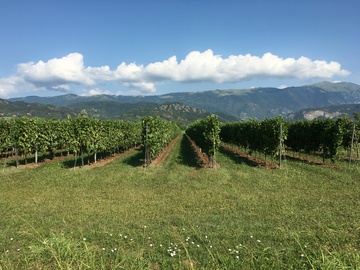 It's difficult to estimate the amount of food you need for breakfast. And it's usually overestimated, at least in my case. And it was. It took more than an hour and extreme amount of energy to finish the breakfast. It would have been certainly smart to order breakfast in the hotel.
It's difficult to estimate the amount of food you need for breakfast. And it's usually overestimated, at least in my case. And it was. It took more than an hour and extreme amount of energy to finish the breakfast. It would have been certainly smart to order breakfast in the hotel.
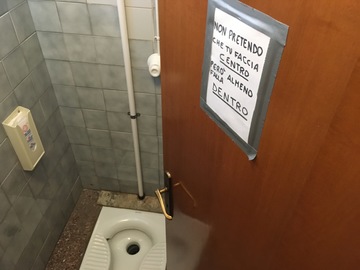 We had to stop right after we started at a nearby café for my breakfast coffee. This one must have been a really local one, as everyone, and really literally everyone was looking at us. I had a cup of coffee. The guy in front of us obviously wanted to talk to us, but didn't manage to do so. I, on the other hand, had nothing to say either, although I might have wanted to talk to him as well. I'll think of a good conversation starter for the next encounter like this one.
We had to stop right after we started at a nearby café for my breakfast coffee. This one must have been a really local one, as everyone, and really literally everyone was looking at us. I had a cup of coffee. The guy in front of us obviously wanted to talk to us, but didn't manage to do so. I, on the other hand, had nothing to say either, although I might have wanted to talk to him as well. I'll think of a good conversation starter for the next encounter like this one.
Not surprisingly, we had an exemplary traditional Italian toilet, elegantly explaining the importance of hitting the hole.
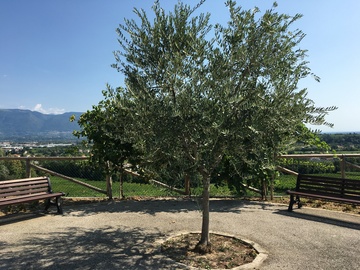 The new route, suggested by outdooractive, initially coincided with the original Munich-Venice route. We were going down a hill for quite some time. On a high summer day, it was going extremely hot and humid over the course of the day. This is Italy. A bit crazy that we were cycling in this weather.
The new route, suggested by outdooractive, initially coincided with the original Munich-Venice route. We were going down a hill for quite some time. On a high summer day, it was going extremely hot and humid over the course of the day. This is Italy. A bit crazy that we were cycling in this weather.
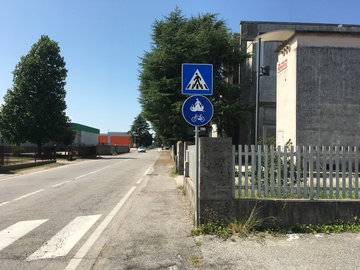 There were, however, tons of cyclists on the way. Not like us travelling over a long distance, but they were cycling on road bikes. Cycling must be really in right now in Italy.
There were, however, tons of cyclists on the way. Not like us travelling over a long distance, but they were cycling on road bikes. Cycling must be really in right now in Italy.
This vacation week must have affected the shops everywhere here, as we could not find any restaurant for lunch even in a medium sized city. We were thinking about skipping the lunch all together, when we found a restaurant in the middle of nowhere.
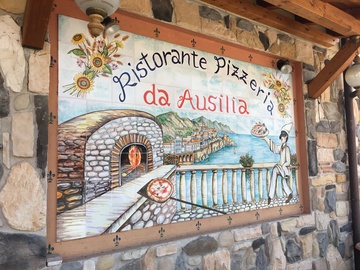 This restaurant must have been quite local as well. At least all the customers and the staff seemed to know each other. Just as every time, we didn't know how the Italian lunch worked, and ordered some stuff randomly. We got an enormous portion of pasta. I don't understand what is the normal portion in this region.
This restaurant must have been quite local as well. At least all the customers and the staff seemed to know each other. Just as every time, we didn't know how the Italian lunch worked, and ordered some stuff randomly. We got an enormous portion of pasta. I don't understand what is the normal portion in this region.
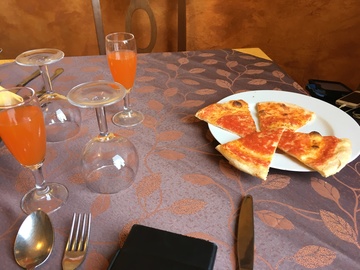 After the lunch, we got melon liquor as digestive (not the glasses on the photo, they are aperitivo). I wanted to give a small tip to the staff, but it is quite uncommon in Italy that people tip, in strong contrast to Germany, where it is almost rude not to tip at all. On the other hand, there's something called "coperto" in Italy, which is the base price that you have to pay in a restaurant regardless of what you order. So maybe it is considered to be included inside this coperto.
After the lunch, we got melon liquor as digestive (not the glasses on the photo, they are aperitivo). I wanted to give a small tip to the staff, but it is quite uncommon in Italy that people tip, in strong contrast to Germany, where it is almost rude not to tip at all. On the other hand, there's something called "coperto" in Italy, which is the base price that you have to pay in a restaurant regardless of what you order. So maybe it is considered to be included inside this coperto.
 We had an extensive siesta after the restaurant (in a place right next to Bavaria). With a shop of liquor and this heat it was the best thing to do. After more than an hour, we were ready to go further.
We had an extensive siesta after the restaurant (in a place right next to Bavaria). With a shop of liquor and this heat it was the best thing to do. After more than an hour, we were ready to go further.
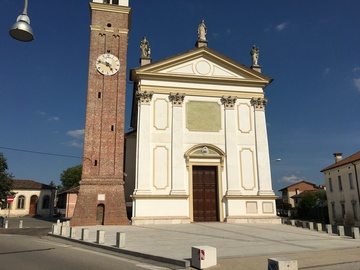 The siesta obviously brought back energy, and we did the rest of the journey pretty much non stop. We left the original route from Munich to Venice at some point and followed the route suggested by outdooractive at some point. And it was a quite good one.
The siesta obviously brought back energy, and we did the rest of the journey pretty much non stop. We left the original route from Munich to Venice at some point and followed the route suggested by outdooractive at some point. And it was a quite good one.
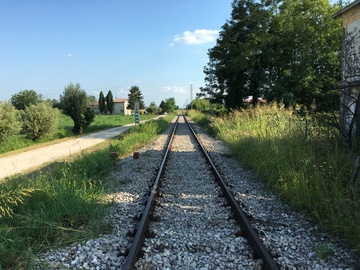 Yesterday, I looked for nearby campsites, but couldn't find many of them. It might have been related to how I looked for them, but my conclusion for now is that it is not very common to camp in Italy, at least not as means of travelling. The thing is, despite this super week, it was fairly easy to find cheap hotels everywhere. So I booked a hotel in the city called Cittadella, without really knowing what it stood for.
Yesterday, I looked for nearby campsites, but couldn't find many of them. It might have been related to how I looked for them, but my conclusion for now is that it is not very common to camp in Italy, at least not as means of travelling. The thing is, despite this super week, it was fairly easy to find cheap hotels everywhere. So I booked a hotel in the city called Cittadella, without really knowing what it stood for.
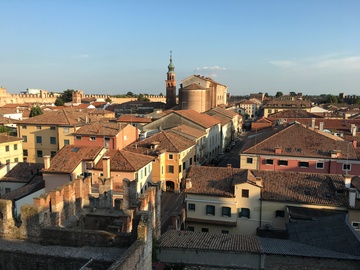 Still before arriving at the city, it was clear from the shape of the city on the map that it was something quite special. It turned out that it was a medieval city that was meant to be a fortress for Padova. And most of what was constructed in the 13th century was still there. We could walk around the city on top of the muro, the rampart surrounding the city.
Still before arriving at the city, it was clear from the shape of the city on the map that it was something quite special. It turned out that it was a medieval city that was meant to be a fortress for Padova. And most of what was constructed in the 13th century was still there. We could walk around the city on top of the muro, the rampart surrounding the city.
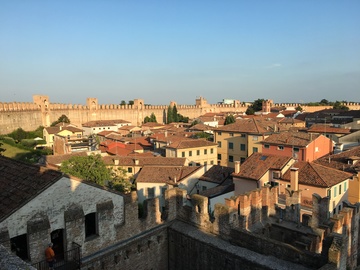 There weren't so many restaurants inside the rampart, and the only one that we found was quite crowded. We somehow arrived in a good point of time as we quickly got a place. There, we had the same problem of what to take. This time, as I didn't have much appetite for pasta or pizza anymore, I got simply roast beef, even though it clearly wasn't an Italian speciality. It was an antipasto, probably a starter. And I guess what I did wasn't quite Italian. At least the order didn't go quite smoothly. Probably I wasn't supposed to order just an antipasto.
There weren't so many restaurants inside the rampart, and the only one that we found was quite crowded. We somehow arrived in a good point of time as we quickly got a place. There, we had the same problem of what to take. This time, as I didn't have much appetite for pasta or pizza anymore, I got simply roast beef, even though it clearly wasn't an Italian speciality. It was an antipasto, probably a starter. And I guess what I did wasn't quite Italian. At least the order didn't go quite smoothly. Probably I wasn't supposed to order just an antipasto.
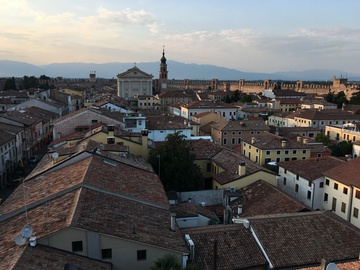 There was a party going on in the city center. Here in Italy, it is probably a bit like in France and not like in Germany: people don't really complain about neighbours having parties all night long. This is at least the impression I got while looking at the buildings nearby, where people must be living and having ordinary lives. I'm sure that it's really cool to live there, but I'm happy that I'm not living right at the market square.
There was a party going on in the city center. Here in Italy, it is probably a bit like in France and not like in Germany: people don't really complain about neighbours having parties all night long. This is at least the impression I got while looking at the buildings nearby, where people must be living and having ordinary lives. I'm sure that it's really cool to live there, but I'm happy that I'm not living right at the market square.
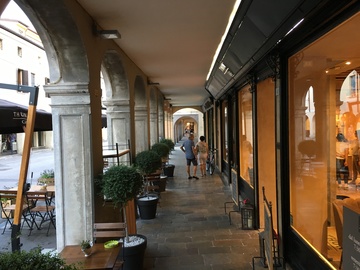 In many cities in Italy the streets are extended to the area half inside the buildings, which allow you to walk around even when it's raining. It's really a pity that it's almost always sunny in Italy and this structure doesn't exist in almost always rainy Germany.
In many cities in Italy the streets are extended to the area half inside the buildings, which allow you to walk around even when it's raining. It's really a pity that it's almost always sunny in Italy and this structure doesn't exist in almost always rainy Germany.
The hotel we booked offered free breakfast, or breakfast was simply included. It was nice to have a cup of coffee at the hotel.
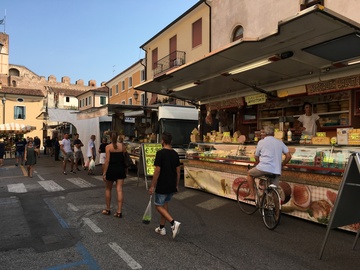 It looked like outdooractive suggested a good route yesterday. Today, it was mere disaster. It looked like we were cycling all the time along with high speed cars in large streets, which almost could have been highways. Beside, we bumped into one way streets from the wrong direction. By the time we had lunch, we were so exhausted from the traffic that we had nothing in mind than looking for an alternative.
It looked like outdooractive suggested a good route yesterday. Today, it was mere disaster. It looked like we were cycling all the time along with high speed cars in large streets, which almost could have been highways. Beside, we bumped into one way streets from the wrong direction. By the time we had lunch, we were so exhausted from the traffic that we had nothing in mind than looking for an alternative.
Speaking of lunch, here in Italy restaurants are apparently closed on Mondays. We managed to find a kebab restaurant (run by a Kurdish guy who learnt the stuff in Germany), but we must have been lucky to have found anything at the first place.
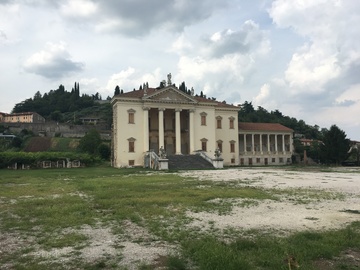 After lunch, we decided to take a new strategy: we choose villages to go through, and decide which streets to take on the spot.
After lunch, we decided to take a new strategy: we choose villages to go through, and decide which streets to take on the spot.
This new strategy, which was actually rather an old strategy for me, worked out quite well. We cycled through vineyards and other kinds of field, going through villages with no tourist at all. It was a cool feeling to be in places where no one expects you to be there. People might look at weirdly, but they might also be intrigued. At least there was a huge unknown factor, which made the trip even more exciting.
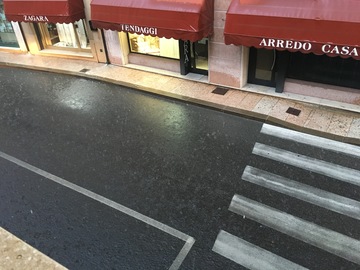 In the evening, we arrived in a small village called Monteforte d'Alpone, where I had found a hotel (and no campsite nearby). Right after we arrived there, it started raining. We went to a nearby supermarket, which was disproportionally large for this village, to buy wine and other small stuff. Since the supermarket was fairly empty, I could talk about what kind of stuff Italians have for their aperitivo with the staff behind the cheese and meat counter. It wasn't particularly different from the apéritif in France (like olives or ham on a small toast).
In the evening, we arrived in a small village called Monteforte d'Alpone, where I had found a hotel (and no campsite nearby). Right after we arrived there, it started raining. We went to a nearby supermarket, which was disproportionally large for this village, to buy wine and other small stuff. Since the supermarket was fairly empty, I could talk about what kind of stuff Italians have for their aperitivo with the staff behind the cheese and meat counter. It wasn't particularly different from the apéritif in France (like olives or ham on a small toast).
Just as yesterday, we got a bottle of local wine for a surprisingly low price. Just as yesterday, it wasn't so bad, although I must say I still prefer French wine to Italian wine, which is slightly too sweet for me.
This hotel, which was more like just a family-run apartment, also offered free breakfast. There were in total three groups staying in this place. In addition to us, there were one Italian family, and one ... German family. The Germans are somehow always there where other Germans are. I'm happy that I was the only one Japanese within kilometers.
There was a strategical problem today: the next city, Verona, was only about 25 km away (too close). The one after Verona, Brescia, would be something like 90 km away (too far away). In between there's this lake called Garda lake, which is an EXTREMELY touristic place and it was impossible to find a hotel over there. Besides, Jen wanted to go to lake Garda. In the end, we decided to book a hotel at Verona, put all the stuff there and take a train to go to lake Garda for a day trip.
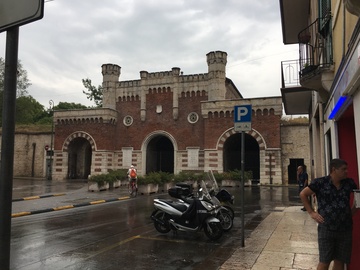 The plan sounded perfect, until we realized that it was rainy today. After the very short journey to Verona, we simply decided to do sightseeing there, instead of going to lake Garda. We'll anyway be passing it tomorrow so there's no need to hurry.
The plan sounded perfect, until we realized that it was rainy today. After the very short journey to Verona, we simply decided to do sightseeing there, instead of going to lake Garda. We'll anyway be passing it tomorrow so there's no need to hurry.
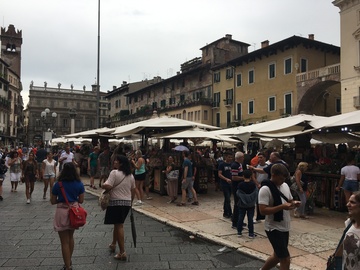 Verona is certainly a big city, but we didn't know anything about its history, or rather, its tourism. The city center was more than overcrowded. There was a significant number of Italian tourists as well, but obviously the largest group was from Germany. Maybe those who are staying near lake Garda simply came over to Verona because of the weather. Actually, except for Germans, there was no large group from any country. There were some French, some Dutch and some Japanese, but they were to see only sporadically.
Verona is certainly a big city, but we didn't know anything about its history, or rather, its tourism. The city center was more than overcrowded. There was a significant number of Italian tourists as well, but obviously the largest group was from Germany. Maybe those who are staying near lake Garda simply came over to Verona because of the weather. Actually, except for Germans, there was no large group from any country. There were some French, some Dutch and some Japanese, but they were to see only sporadically.
In this crowd, all I was trying to do was to be a standard tourist, taking photos of historical-looking monuments and ordering meaningless cup of espresso. Since Jen is German, I really wanted her to order pizza and cappuccino, but she already knows that cappuccino is a breakfast drink.
 I know in such a touristic place, service at cafés won't be as appropriate as it traditionally should be, but I wasn't expecting a cup of espresso in a plastic cup.
I know in such a touristic place, service at cafés won't be as appropriate as it traditionally should be, but I wasn't expecting a cup of espresso in a plastic cup.
Tomorrow is the Farragosto, i.e. everything will be closed. We bought some stuff for dinner and for breakfast, hoping we'd find restaurants on the way. At least by noon we'll be at lake Garda and I'm pretty sure that there'll be some restaurants for the German tourists there.
Here the temperature during the day was probably something like 25 °C, but somehow it didn't go down much in the night. Apparently it's cool again in Germany. I'm really looking forward to sleeping there. There are also an infinite number of mosquitoes in this region. Even during the day they are active.
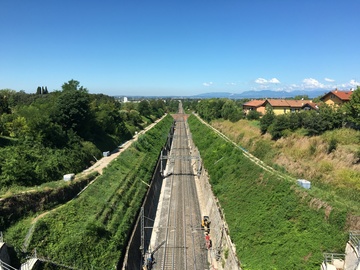 We left the apartment around 10am next day. The weather changed drastically and it was already hard to stay in the sunshine. Looking at my fully burnt arms, I wonder what kind of reaction I'm going to see at my workplace next week.
We left the apartment around 10am next day. The weather changed drastically and it was already hard to stay in the sunshine. Looking at my fully burnt arms, I wonder what kind of reaction I'm going to see at my workplace next week.
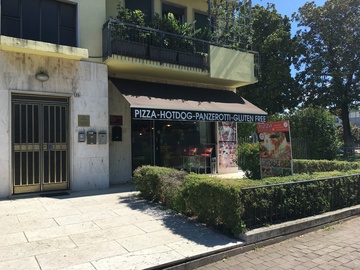 It was rather a catastrophe with outdooractive yesterday, but it looked more or less okay today, so we decided to follow the route again. And luckily, it was quite okay. We were cycling through the vineyards most of the time. Vineyards being quite rare around Düsseldorf, I'm not going to complain, but I wouldn't mind seeing other stuff than vineyards as well now.
It was rather a catastrophe with outdooractive yesterday, but it looked more or less okay today, so we decided to follow the route again. And luckily, it was quite okay. We were cycling through the vineyards most of the time. Vineyards being quite rare around Düsseldorf, I'm not going to complain, but I wouldn't mind seeing other stuff than vineyards as well now.
So, today was the long awaited Farragosto, an important holiday for Italians next to Christmas. Farragosto being religious, there was a Mass in every church on the way. At the same time, all the local restaurants/bars seemed to be occupied by the locals. Just as Nicola told us, it must be an important local celebration as well.
We were told that there won't be anything open. In reality, the supermarkets were probably open in the morning. In the afternoon, indeed all the shops seemed to be closed, except for restaurants or bars. In the end it wasn't as much of a problem as we had feared. Also we had quite some stuff to eat.
Since it was almost like a break yesterday, we could cycle almost non-stop today. We stopped at a gas station, where they simply left tables and chairs outside even though all the service was closed except for self-service petrol. The 70 km we did today felt like nothing.
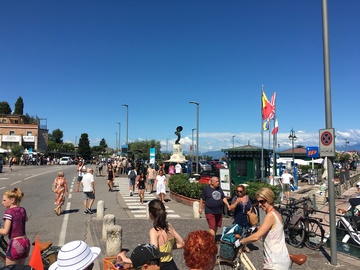 We arrived at Lake Garda. And when we arrived there, I wished we hadn't. It was a horrifying view with infinite number of German and Dutch tourists with no space for bicycle to cross the area. Jen's wish to swim there quickly evaporated and we simply continued cycling from there. I'm happy that we didn't have to stay there even a minute more.
We arrived at Lake Garda. And when we arrived there, I wished we hadn't. It was a horrifying view with infinite number of German and Dutch tourists with no space for bicycle to cross the area. Jen's wish to swim there quickly evaporated and we simply continued cycling from there. I'm happy that we didn't have to stay there even a minute more.
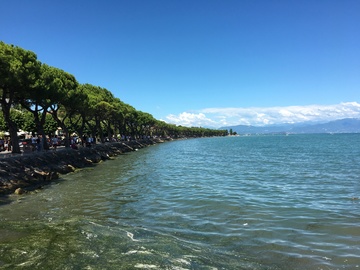 We arrived at Brescia quite early today. We put our stuff at the hotel Igea, which sounds like a furniture shop in Bavaria, and roamed around the city together.
We arrived at Brescia quite early today. We put our stuff at the hotel Igea, which sounds like a furniture shop in Bavaria, and roamed around the city together.
Here, for the first time, we ordered one antipasto together and each of us ordered something else (Jen pizza and me pasta). With the antipasto (which was tomato and mozzarella), we got two plates. And the order went really smoothly. So my current conclusion is that the antipasti are supposed to be shared among the people at the table and still are considered to be side dishes. I feel like I became more Italian than what I used to be.
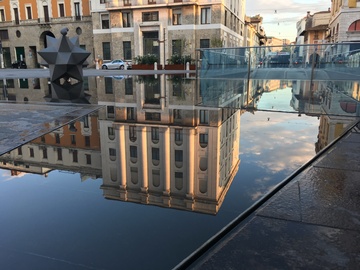 The city of Brescia was really empty. Compared to the mess in Verona, it was REALLY empty. According to Nicola, people celebrate Farragosto at seasides or in the mountains, so it was probably not really a surprise that we didn't see anyone inside the city.
The city of Brescia was really empty. Compared to the mess in Verona, it was REALLY empty. According to Nicola, people celebrate Farragosto at seasides or in the mountains, so it was probably not really a surprise that we didn't see anyone inside the city.
 We were at the market place, when out of nowhere this drum musicians appeared and started drumming. The cool thing, the garbage man arrived with a car and could not go further because of the musicians. Then the garbage man simply waited until the end of the music. That's probably Italian. Germans would have honked immediately.
We were at the market place, when out of nowhere this drum musicians appeared and started drumming. The cool thing, the garbage man arrived with a car and could not go further because of the musicians. Then the garbage man simply waited until the end of the music. That's probably Italian. Germans would have honked immediately.
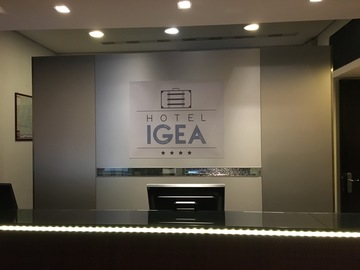 As I already stated above, we are not going to Venice anymore but heading for Milan, where our bus for Düsseldorf is going to depart this Sunday. When we first changed the direction, we thought there might be a day or two with rain, or other problems that might have hindered our trip. This didn't really happen and therefore we're now having a day too much. So, instead of going to Milan directly, we decided to take a detour around the lake Iseo, which we didn't know before, but looked like a nice one near lake Garda. Luckily, we could also find a hostel to the north of the lake, so that we'll be arriving at the lake from the south, cycle along the lake completely to the north, then go south-west to arrive at Bergamo. Lake Iseo being inside the region called Prealps, we can probably even expect a fairly mountainous region.
As I already stated above, we are not going to Venice anymore but heading for Milan, where our bus for Düsseldorf is going to depart this Sunday. When we first changed the direction, we thought there might be a day or two with rain, or other problems that might have hindered our trip. This didn't really happen and therefore we're now having a day too much. So, instead of going to Milan directly, we decided to take a detour around the lake Iseo, which we didn't know before, but looked like a nice one near lake Garda. Luckily, we could also find a hostel to the north of the lake, so that we'll be arriving at the lake from the south, cycle along the lake completely to the north, then go south-west to arrive at Bergamo. Lake Iseo being inside the region called Prealps, we can probably even expect a fairly mountainous region.
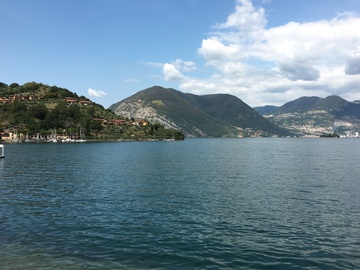 With this in mind, we started cycling next day, after we went to a nearby bike shop to repair Jen's bike (the sprocket of her bike got damaged), which they did for free. So nice people.
With this in mind, we started cycling next day, after we went to a nearby bike shop to repair Jen's bike (the sprocket of her bike got damaged), which they did for free. So nice people.
When we left Brescia, we met an old Italian guy on wheels. He was a retired engineer living in Provaglio d'Iseo, which was on the way for us too. His name was Luigi, and this was not the very first Luigi that we met in Italy. He didn't particularly seem eager to talk to me at first, but on the way up to Provaglio, he talked quite a lot. The cycling route was surrounded by vineyards again, and he was saying the grape, Franciacorte, makes high quality wine. That's a great piece of information as I don't know so much about Italian wine.
After Luigi abruptly left us at Provaglio, we went further to the lake. It was certainly a touristic place, but was clearly not comparable with lake Garda. There were also mainly Italians at lake Iseo, compared to the chunk of Germans we saw at lake Garda. And I must say, the water quality was way better at Iseo than Garda. It's sad that people go to famous places to suffer from the fact that the famous places attract a lot of people.
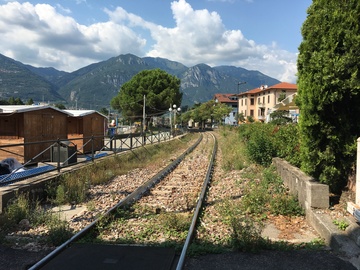 Going towards the north of the lake, we saw less and less tourists on the way. Probably this is rather a local place, just as we suspected.
Going towards the north of the lake, we saw less and less tourists on the way. Probably this is rather a local place, just as we suspected.
Since our hostel was in the middle of nowhere in a mountainous area, we decided to buy dinner and breakfast at a nearby supermarket beforehand. I had to ask the staff to find a bottle of Franciacorte, a local one that Luigi recommended to us, as there were so many different wines, unsorted. The very person I asked was obviously an expert in the area and explained to me what kinds of Franciacorte there were. Apparently, most of them are sparking wine (to different degrees) and above all, quite expensive. Since we were not having a fridge at the hostel, I didn't want a sparkling wine, which already limited the number significantly. And since the wine is anyway good almost regardless of the price (although we've already had one bad bottle), we didn't spend so much money either. The wine boy continued explaining the stuff, and at some point he showed me one bottle, from 2008... Usually the wine you can easily buy in a supermarket is not something that you should keep for a long time, they say. I personally never have tried aged wine. Not too expensive. So why not taking the risk.
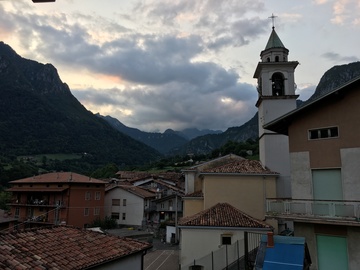 We went towards the hostel, which as I already stated was inside a mountainous area. Good that it wasn't all flat in Italy. After dinner at the hostel, we were drinking the wine from 2008: indeed it tasted like it was aged for quite some time. At least the 10 years didn't make the wine worse.
We went towards the hostel, which as I already stated was inside a mountainous area. Good that it wasn't all flat in Italy. After dinner at the hostel, we were drinking the wine from 2008: indeed it tasted like it was aged for quite some time. At least the 10 years didn't make the wine worse.
While we were drinking wine on the balcony, there was one Italian guy who appeared there to smoke. He was a local and we first started talking about our bicycle trip. Then it went over to his honeymoon to Japan when he found out that actually I was Japanese. Even though he couldn't remember much about his trip anymore and I'm anyway not the person to talk about Japanese stuff with, he seemed to be excited about talking to a foreigner like me. I find it really great that Italians don't really care where a person comes from. Obviously, as long as they manage to communicate, the rest isn't so important. That's the impression that I got in the encounters that I've had so far.
Next day, after a rapid breakfast, we went down the hill very quickly up to the point we started climbing up and we cycled along the lake, the other end though, for some time. This area was more touristic this time. This being the same lake, it didn't interest us that much anymore. We simply went further.
We had to climb up a hill again after the lake. While doing so, I noticed one thing: from the very beginning, I could go up a hill much faster than Jen, but now, I was WAY faster tan her. This was the very first time that I cycled with a girl for some time, and I don't know how their muscles develop, but obviously not with the same speed as the male muscles do. At least except for sweating a lot, I don't really feel anything anymore.
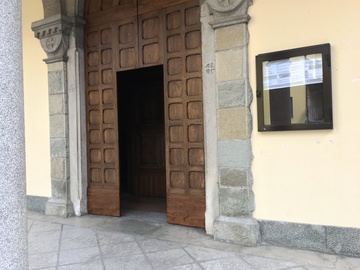 There was a funny thing about Italian churches: the entrance is often open. It might be difficult to recognize on the photo, but it's not just the first door, but the second door is open as well, so that we can see directly what's happening inside. When there's a mass, you can also hear the choir from outside every now and then, which was quite often the case this week probably due to the holiday week.
There was a funny thing about Italian churches: the entrance is often open. It might be difficult to recognize on the photo, but it's not just the first door, but the second door is open as well, so that we can see directly what's happening inside. When there's a mass, you can also hear the choir from outside every now and then, which was quite often the case this week probably due to the holiday week.
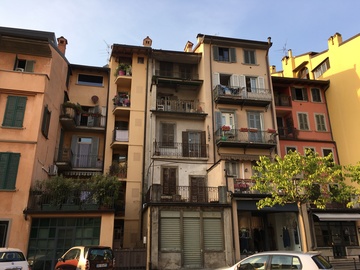 Nearing Milan, there was less and less nature. Now it looks almost like we were simply going towards the end of our journey. Whether it's with maps.me or with outdooractive, the route was horrible. On the other hand, we could arrive at today's city, Bergamo, much earlier than planned.
Nearing Milan, there was less and less nature. Now it looks almost like we were simply going towards the end of our journey. Whether it's with maps.me or with outdooractive, the route was horrible. On the other hand, we could arrive at today's city, Bergamo, much earlier than planned.
As I already stated above, we are not staying at campsites anymore, but book different places with hotels.com. This time, just like in Verona, we got another apartment. The owner of this apartment living nearby, we just had to call him to get the keys. It is still not clear, whether he spoke English or not. Certainly he wasn't particularly good at it, as at the beginning he asked me whether Jen or I speak Italian and gave all the explanations in Italian after I told him I do but Jen doesn't. I was slightly surprised when Jen considered it as "impolite", since for me, not being able to speak English is maybe inconvenient or uncomfortable, but I don't see why people not speaking a non-local language should be considered impolite, as the premise of hotel business doesn't require the clients to be foreigners. But maybe hers is a German point of view, and it's certainly not bad that many Germans do speak English.
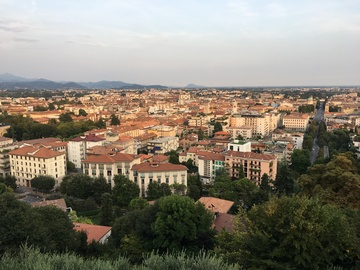 I have heard of this city before, but I'm not quite the expert of Italian cities. The owner of this apartment explained to me that there's what's called Città Alta (high/upper city), which is like a fortress and registered as a UNESCO world heritage. With so much time and nothing to do, we walked up there on foot. Nice to be on foot again.
I have heard of this city before, but I'm not quite the expert of Italian cities. The owner of this apartment explained to me that there's what's called Città Alta (high/upper city), which is like a fortress and registered as a UNESCO world heritage. With so much time and nothing to do, we walked up there on foot. Nice to be on foot again.
 And as expected, it was crowded with tourists. We made a photo from the fortress, walked through the inside of the fortress and went down. There was a university inside the fortress. Some time in the future, I must travel around the world to visit universities around the world. Not just make beautiful photos (which can already be found on Wikipedia), but to picture myself as a scientist there. I have been having this idea for quite some time, but due to its ill-defined concept, I haven't made it happen so far. But surely I'll do it some time in the future, so please look forward to that :)
And as expected, it was crowded with tourists. We made a photo from the fortress, walked through the inside of the fortress and went down. There was a university inside the fortress. Some time in the future, I must travel around the world to visit universities around the world. Not just make beautiful photos (which can already be found on Wikipedia), but to picture myself as a scientist there. I have been having this idea for quite some time, but due to its ill-defined concept, I haven't made it happen so far. But surely I'll do it some time in the future, so please look forward to that :)
In the city center, we looked for a restaurant. We spotted a random pizzeria, which was full and made us wait a few minutes, which we thought was quite promising. Yet, regardless of the quality of the restaurant, what I hate most happened. Something subtle, but had a devastating effect some time in the past...
Waiter: "... and what do you want for drink?"
At the beginning of this article, I said I went to Italy twice. It's just an objective fact, but in reality, maybe we should remember that I lived in a city near the Italian border for 3 years, I spoke fairly fluent Italian and I had huge interest in Italian culture. All this makes it inexplicable that I went there only twice, one of which was not even my decision.
After my bike trip from France to Japan 6 years ago, in which I discovered Italy, and discovered my knowledge of the Italian language, I was highly motivated to go to Italy again at some point. With the small amount of money I had at that time, I couldn't get there right away, but still looked forward to the next opportunity. At the same time, I also read Italian newspapers, watched Italian TV etc. in order to keep my Italian afloat. I didn't look for anyone to talk to in Italian. For me, Italian was much more a natural language that I had to speak casually. So I didn't really want to look for a "language partner". After all, Italy was right next to Lyon. I'll certainly get Italian friends soon, I thought.
A year and half later, it happened. I was friends with someone who happened to want to learn German but already spoke it quite well, too. Great, I thought. At the beginning she wanted to learn French first so we talked in French.
Later on, I suggested to speak Italian and German. From that point on, I talked to her only in Italian. It was meant to be the following of an exciting experience in Italy for me. Yes, meant to be. The reality was very different.
I ask something in Italian, the reply comes back in French. Hmm. Weird. Maybe she thought it was French. After all, they are similar languages. Then I talk to her again in Italian. Again, the reply comes back in French.
It didn't matter what I said in Italian, whether a short phrase or a long, a simple or a complicated. The reply always came back in French. I got confused, especially because it is an extremely difficult thing for me to continue a conversation in different languages. There must have been a reason that she didn't want to speak Italian with me.
At some point, I asked her why she ignored my Italian. I got a few reasons ranging from she didn't know I could speak Italian to she wasn't aware that I was speaking Italian etc. All this didn't make sense to me. I was startled. It appeared to me like she was hiding something.
A few years later, I'd find out that there is a certainly number of people, who cannot speak a different language to a person that they started speaking to in a certain language. If you start talking to them in English for example, it doesn't matter which language you speak, they will always reply in English, which is exactly the opposite to me, since if you for example talk to me in French, it's extremely difficult for me not to reply in French. For me, unfortunately, she was the very first person who was like this. And while facing this new kind of person, all I thought was she was being dishonest with me.
I was starting to have the sensation that the intention of speaking Italian itself is something useless, something to be ignored. Yes, whether my message was semantically fully transmitted or not, I felt like I was simply ignored. At some point, I could discern the change in myself: even though I was reading the same newspapers, even though I was watching the same Italian TV, I was doing all this absent-mindedly. I had to try hard to keep going, but with every single reply in French, my ambition flew away.
My motivation was gone.
By then, I started taking it quite personally. I started hating her, the Italian language, all those who spoke Italian and above all, Italy. I stopped all the efforts.
To this day, I still don't know what it would have been like if all this hadn't happened, and wonder how a subtle occurrence like this can form a completely different future. I see that I still haven't fully recovered from the scar, as whenever I make a mistake in Italian or I don't know certain words, I can't stop thinking I might have spoken perfect Italian if all this hadn't happened. Since then, I met quite some Italians. And whereas I do some effort to actively restore my interest in the Italian culture, I never talk to them in Italian, out of fear that the same horror comes back. At least, which language it is, I don't take it personally anymore. And the same problem is happening with my Spanish flatmates, it is fortunate that I've overcome this problem at the personal level (even though accordingly Spanish is therefore not my favorite language).
To a certain extent, I do understand that the waiters in the touristic cities are tired of hearing tourists saying one or two words in Italian. Or maybe they are not tired, but they are used to simply replying them in English. But I would like them to remember, that there's a certain number of people, who seriously try to understand their language, and there's no reason to believe that they should continue speaking English with them.
I don't really remember what I had for dinner in this restaurant. I simply didn't like it. I was simply happy to leave this place.
It's getting later and later every day that we wake up in the morning. It was almost 9am today. My expectation for getting up early in the morning at the campsites is falling apart.
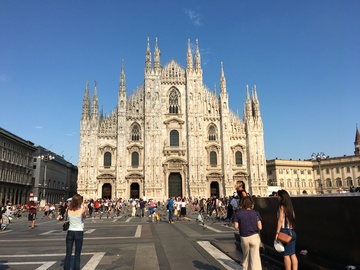 Today, it was really just all about how to get to Milan. Today is de facto the last day, so it's not quite surprising that what we were doing was simply needed from the organizational point of view. At least we arrived at Milan quite early in the afternoon, which allowed us to do some tourism. Tourism in Milan is complicated. And I'd strongly recommend you not to go to Milan in summer. It's just hot, and you'll be offered everything twice as expensive as usual.
Today, it was really just all about how to get to Milan. Today is de facto the last day, so it's not quite surprising that what we were doing was simply needed from the organizational point of view. At least we arrived at Milan quite early in the afternoon, which allowed us to do some tourism. Tourism in Milan is complicated. And I'd strongly recommend you not to go to Milan in summer. It's just hot, and you'll be offered everything twice as expensive as usual.
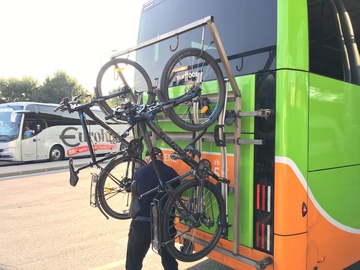 And so did my vacation in Italy go to an end. Next day, we took a bus from Milan to Düsseldorf, a powerful 15-hour ride.
And so did my vacation in Italy go to an end. Next day, we took a bus from Milan to Düsseldorf, a powerful 15-hour ride.
Closing words
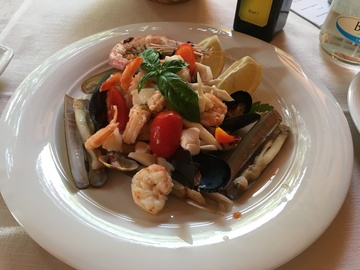 For a long time in my life, Italy didn't mean much to me. All this changed when I first went to Italy 6 years ago. And one more time, when my admiration for Italy was torn apart a few years later. Yet looking at its essence, it didn't go much beyond the Italian language. I wonder what I knew about Italy otherwise. In this sense, it's maybe not wrong to say it was the first time that I went there to know the country.
For a long time in my life, Italy didn't mean much to me. All this changed when I first went to Italy 6 years ago. And one more time, when my admiration for Italy was torn apart a few years later. Yet looking at its essence, it didn't go much beyond the Italian language. I wonder what I knew about Italy otherwise. In this sense, it's maybe not wrong to say it was the first time that I went there to know the country.
Opening a menu in a restaurant, looking for "Antipasti", which every time brought something new and unexpected... In reality, my entire stay in Italy was like opening a restaurant menu. They have always been there, yet there was a new discovery every time. The beauty of its mere existence is what made Italy so attractive to me.
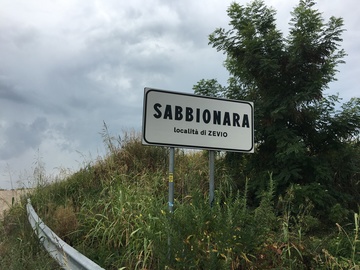 A few days went on, I was in an Italian restaurant in Düsseldorf. In the menu was cappuccino, the rude Italian waiter brought an antipasto of a size for one person. Obviously, it doesn't matter whether the restaurant is supposed to be Italian or not. What is Italy is apparently only in Italy. So, even though Italy seems to be all around, it makes still sense to go there to see the "real" Italy. And of course, not to forget the great nature and rich history.
A few days went on, I was in an Italian restaurant in Düsseldorf. In the menu was cappuccino, the rude Italian waiter brought an antipasto of a size for one person. Obviously, it doesn't matter whether the restaurant is supposed to be Italian or not. What is Italy is apparently only in Italy. So, even though Italy seems to be all around, it makes still sense to go there to see the "real" Italy. And of course, not to forget the great nature and rich history.

